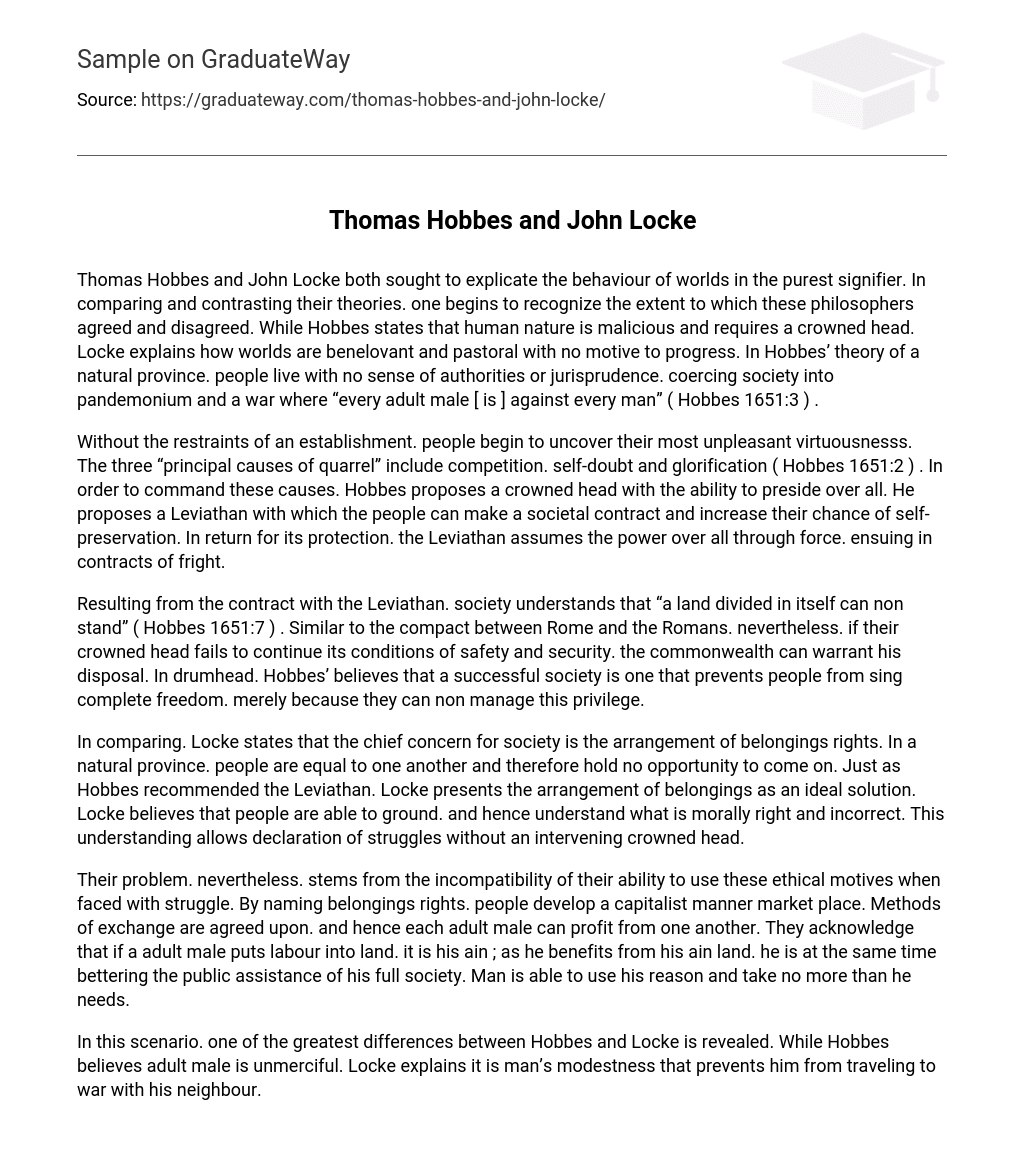Thomas Hobbes and John Locke both sought to explicate the behaviour of worlds in the purest signifier. In comparing and contrasting their theories. one begins to recognize the extent to which these philosophers agreed and disagreed. While Hobbes states that human nature is malicious and requires a crowned head. Locke explains how worlds are benelovant and pastoral with no motive to progress. In Hobbes’ theory of a natural province people live with no sense of authorities or jurisprudence coercing society into pandemonium and a war where “every adult male [ is ] against every man” ( Hobbes 1651:3 ) .
Without the restraints of an establishment people begin to uncover their most unpleasant virtuousnesss. The three “principal causes of quarrel” include competition self-doubt and glorification ( Hobbes 1651:2 ) . In order to command these causes. Hobbes proposes a crowned head with the ability to preside over all. He proposes a Leviathan with which the people can make a societal contract and increase their chance of self-preservation. In return for its protection. the Leviathan assumes the power over all through force ensuing in contracts of fright.
Resulting from the contract with the Leviathan. society understands that “a land divided in itself can non stand” ( Hobbes 1651:7 ) . Similar to the compact between Rome and the Romans. nevertheless. if their crowned head fails to continue its conditions of safety and security the commonwealth can warrant his disposal. In drumhead Hobbes’ believes that a successful society is one that prevents people from sing complete freedom. merely because they can non manage this privilege.
In comparing. Locke states that the chief concern for society is the arrangement of belongings rights. In a natural province. people are equal to one another and therefore hold no opportunity to come on. Just as Hobbes recommended the Leviathan. Locke presents the arrangement of belongings as an ideal solution. Locke believes that people are able to ground and hence understand what is morally right and incorrect. This understanding allows declaration of struggles without an intervening crowned head.
Their problem. nevertheless. stems from the incompatibility of their ability to use these ethical motives when faced with struggle. By naming belongings rights people develop a capitalist manner market place. Methods of exchange are agreed upon and hence each adult male can profit from one another. They acknowledge that if a adult male puts labour into land it is his ain ; as he benefits from his ain land. he is at the same time bettering the public assistance of his full society. Man is able to use his reason and take no more than he needs.
In this scenario. one of the greatest differences between Hobbes and Locke is revealed. While Hobbes believes adult male is unmerciful. Locke explains it is man’s modestness that prevents him from traveling to war with his neighbour. In Locke’s society. people are rational. but do non ever pattern this reason. Therefore. they must give up a small freedom. in order to derive wealth and get benefits. Hobbes and Locke portion the thought that in the province of nature. work forces are equal.
Despite man’s equality. both philosophers besides believe adult male is invariably at hazard of jeopardizing himself. Where their theories contrast is in the definition of a societal contract and with whom. While Hobbes maintains a negative position of war and force. Locke’s position presents a more positive mentality. While Hobbes puts Forth a authorities with totalitarian values. Locke’s authorities represents a broad monarchy. Hobbes believes a societal contract exists between a crowned head and his people ; he obtains absolute power and can non be overthrown.
In contrast Locke’s authorities is conditional and depends on the societal contracts between society members. Traits of Hobbes’ natural province are still apparent today in some societies. Without just authoritiess corrupt populations will try to subvert unfair swayers. A recent illustration is the 2011 Libyan revolution. Under Mummar Gaddaffi the Libyan people felt their authorities was no longer moving in their best involvement. As a consequence they overthrew their oppressive swayers and abolished the unlawful authorities capturing and finally killing Gaddaffi.





